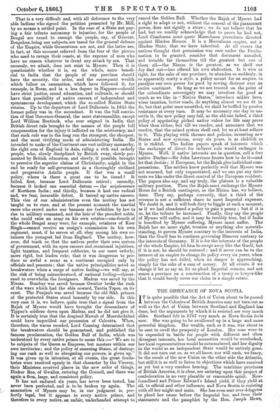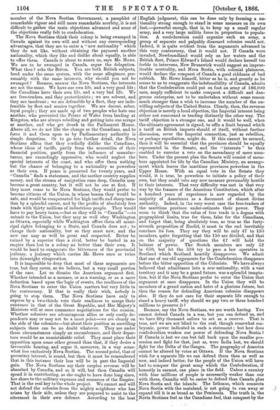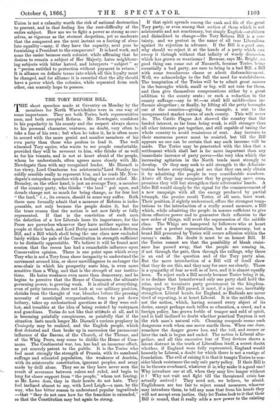THE GRIEVANCE OF NOVA SCOTIA.
IT is quite possible that the Act of Union about to be passed
between the Colonies of British America may not turn out as well as the Act of Union between Scotland and England has done, but the arguments by which it is resisted are very much alike. Scotland felt in 1707 very much as Nova Scotia feels now. She was going to be swallowed up in a large and more powerful kingdom. Her wealth, such as it was, was about to be sent to swell the prosperity of London. Her sons were to be expended in battle for people with different and often divergent interests, her local necessities would be overlooked, her local representatives would be outnumbered, and her dignity in the world as an independent State would be entirely gone. It did not turn out so, as we all know, nor will such, we fancy, be the result of the new Union on the other side the Atlantic, but still it is as well to listen to objections which have received as yet but a very careless hearing. The maritime provinces of British America, it is clear, are entering upon this project of confederation in no very placable or reasonable spirit. New- foundland and Prince Edward's Island yield, if they yield at all, to official and other influence, and Nova Scotia is resisting with all her might and main She has even sent over delegates to plead her cause before the Imperial bar, and from their statements and the pamphlet by the Hon, Joseph aowe,
member of the Nova Scotian Government, a pamphlet of remarkable vigour and still more remarkable acerbity, it is not difficult to gather the main objections advanced and some of the objections really felt to confederation.
The Nova Scotians think their colony is being swamped in Canada against its own will and without any corresponding advantages, that they are to enter a " new nationality " which they do not like, without obtaining the payment another nationality, which they like and dislike about equally, is able to offer them. Canada is about to annex us, says Mr. Howe. We are to be swamped in Canada, argue the delegation. What then ? asks the Briton. You are both British subjects, bred under the same system, with the same allegiance, pre- sumably with the same interests, why should you not be swamped ? Because, answer the Nova Scotians, the interests are not the same. We have our own life, and a very good life ; the Canadians have their own life, and a very bad life. We are free-traders, and they protectionists ; we are solvent, and they are insolvent ; we are defensible by a fleet, they are inde- fensible by fleet and armies together. We are decent, sober, loyal people ; they are made up of two peoples who hate one another, who prevented the Prince of Wales from landing at Kingston, who are always rebelling and getting into one scrape or another, and who get drunk in the Parliament House. Above all, we do not like the change or the Canadians, and to force it and them upon us by Parliamentary authority is simple despotism. Or to go into further detail, the Nova Scotians affirm that they cordially dislike the Canadians, whose ideas of tariffs, partly from the necessities of their financial position, partly from the influence of manufac- turers, are exceedingly oppressive, who would neglect the special interests of the coast, and who offer them nothing but the chance of belonging to a nationality as powerless as their own. If peace is preserved for twenty years, and "Canadia" finds a statesman, and the mother country supplies money, and the stream of emigration runs deep, Canadia may become a great country, but it will not be one at first. If they must cease to be Nova Scotians, they would prefer to become citizens of the Union, in whose bosom they would be safe, and would be compensated for high tariffs and sharp taxa- tion by a splendid career, and by the profits of absolutely free trade with thirty millions of industrious people. They would have to pay heavy taxes,—but so they will in "Canadia"—to submit to the Union, but they may as well obey Washington as Ottawa, especially while Washington offers them all muni- cipal rights belonging to a State, and Canada does not ; to change their nationality, but so they must now, and the new one may as well be great and respected. Better be ruined by a superior than a rival, better be buried in an empire than lost in a colony no better than their own. It would be hard to exaggerate the bitterness of the provincial jealousy, a jealousy which carries Mr. Howe once or twice into downright vituperation.
It is impossible to deny that most of these arguments are true, but they cover, as we believe, but a very small portion of the case. Let us dismiss the American argument first. Whether intended as a menace, or as a warning, or as a mere deduction based upon the logic of events, the readiness of the Nova Scotians to enter the Union matters but very little in the controversy. If that is really their wish, nobody is going to stop them. The Nova Scotians have only to express by a two-thirds vote their readiness to merge their existence in that of the Great Republic, and Her Majesty's Ministers will at once commence negotiations for the cession. Whether colonists are advantageous allies or only costly de- pendents may or may not be a moot point—we are clearly on the side of the colonists—but about their position as unwilling subjects there can be no doubt whatever. They are under those circumstances simply an encumbrance, and their depar- ture would be an unmistakable relief. They must place their opposition upon some other ground than that, if they desire a favourable hearing, and argue it, moreover, in a way some- what less exclusively Nova Scotian. The second point, that of pecuniary interest, is sound, but then it must be remembered that in this instance their loss will be in part the Imperial gain. The Nova Scotians say their surplus revenue will be absorbed by Canadia, and so it will, but then Canadia will spend it in contributing, as she ought to have done long since, her share to the military expenses and resources of the Empire. That is the real key to the whole project. We cannot and will not defend the colonies from the mighty neighbour who has arisen by their side, unless they are prepared to assist to the uttermost in their own defence. According to the best English judgment, this can be done only by forming a na- tionality strong enough to stand in some measure on its own feet, —powerful enough, that is, to keep up a small regular army, and a very large militia force in proportion to popula- tion. A confederation could organize such an army, a group of separate and palpably disarmed colonies could not. Indeed, it is quite evident from the arguments advanced in this very controversy, that it would not. If Canada were invaded, Newfoundland would rely on her waters and the British fleet, Prince Edward's Island would declare herself too feeble to intervene, New Brunswick would suggest an imprac- ticable neutrality, and Nova Scotia, with colonial plainness, would declare the conquest of Canada a good riddance of bad rubbish. Mr. Howe lupaself, bitter as he is, and greatly as he seems to us to exaggerate the indefensibility of Canada, admits that the Confederation could put on foot an army of 186,000 men, amply sufficient to make conquest a difficult and dan- gerous enterprise, not to be undertaken without some reason much stronger than a wish to increase the number of the un- willing subjects of the United States. Clearly, then, the revenue objection is merely a local objection, the Imperial interest being either not concerned or tending distinctly the other way. The tariff objection is a stronger one, and it would be well, when the ultimate agreement is signed, to affix a limit beyond which a tariff on British imports should of itself, without further discussion, sever the Imperial connection, just as rebellion, or perhaps repudiation, might do. If this cannot be secured, then it will be essential that the provinces should be equally represented in the Senate, and the "interests " be thus enabled to exercise a veto on the ascendancy of mere num- bers. Under the present plan the Senate will consist of mem- bers appointed for life by the Canadian Ministry, an arrange- ment which leaves the maritime provinces powerless in the Upper House. With an equal vote in the Senate they would, it is true, be powerless to initiate a policy of their own, but they could veto any new measure presumably hostile to their interests. That very difficulty was met in that very way by the framers of the American Constitution, which after a hundred years of experience is now regarded by the majority of Americans as a document of almost divine authority. Indeed, in the very worst case the free-traders of the maritime province under-estimate their power. They seem to think that the value of free trade is a dogma with geographical limits, true for them, false for the Canadians, and forget that, being absolutely true, as true as the forty- seventh proposition of Euclid, it must in the end inevitably convince its foes. They say they will be only 47 to 150 members, quite forgetting that the 150 are divided, and that on the majority of questions the 47 will hold the balance of power. The Scotch members are only 52 in 650, but let the 598 try to pass a law operative in Scotland which Scotland heartily disapproves. We admit that one of our old arguments for the Confederation disappears before the bitter opposition of the Colonists. We have always believed that admittance into a new nationality, with a vast territory and it may be a grand future, was a splendid tempta- tion, but if the Nova Scotians prefer to enter the Union that argument at once disappears. In the Union they will be members of a grand nation and heirs of a glorious future, but then the reason for defending American colonies disappears also. If they do not care for their separate life enough ta stand a heavy tariff, why should we pay two or three hundred millions to preserve it ?
Because, say the Nova Scotians, we are worth having. You cannot defend Canada in a war, but you can defend us, and we have fifty thousand sailors to act as a reserve. That is true, and we are not blind to the real, though somewhat em- bryonic, power indicated in such a statement ; but how does confederation weaken our power of defending Nova Scotia ? If Canada is lost we can but fall back upon the smaller pos- session and fight for that, just as, were India lost, we should' fight for the Delta of the Ganges. The geography of America cannot be altered by votes at Ottawa. If the Nova Scotians wish for a separate life we can defend them then as well as now, and indeed better, for the people of the Union will have had to conquer the great army which the Confederation, if honestly in earnest, can place in the field. Unless a country with four millions of people is necessarily weaker than one with three, Canadia will be easier to defend than Canada plas Nova Scotia and the islands. The Isthmus, which connects Nova Scotia with the mainland, is not going to run away or expand till it is as broad as the Peninsula. The truth is, the Novia Scotians feel as the Canadians feel, that conquest by the Union is not a calamity worth the risk of national destruction to prevent, and in that feeling lies the root-difficulty of the entire subject. How are we to fight a power as strong as our- selves, as vigorous as the sternest despotism, yet so moderate that the conquered are the next instant on a footing of abso- lute equality—may, if they have the capacity, next year be furnishing a President to the conquerors? It is hard work, and none the easier because each colonist, while affirming that he desires to remain a subject of Her Majesty, hates neighbour- ing subjects with bitter hatred, and interprets " subject " as a " person entitled to protection without payment in return." It is alliance on definite terms into which all this loyalty must be changed, and for alliance it is essential that the ally should have a power which the colonies, while separated from each other, can scarcely hope to possess.
































 Previous page
Previous page